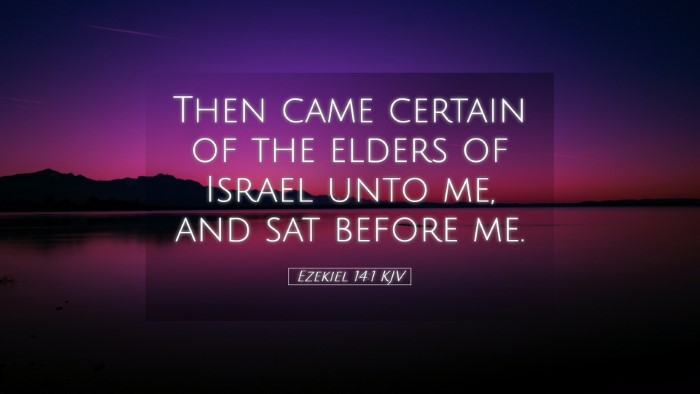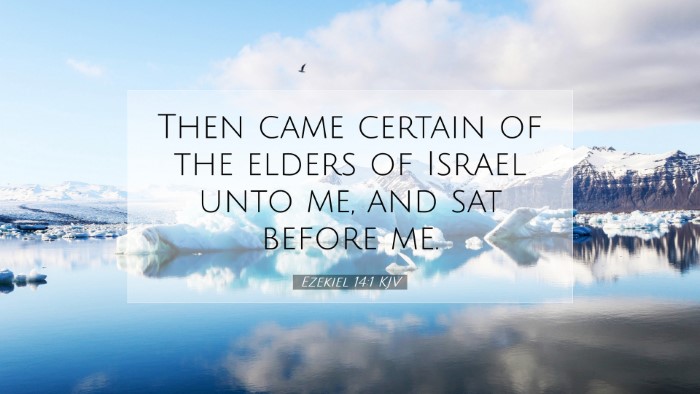Ezekiel 14:1 - Commentary and Insights
Bible Verse: "Then came certain of the elders of Israel unto me, and sat before me."
Introduction
Ezekiel 14:1 captures a moment where the elders of Israel approach the prophet Ezekiel, seeking counsel and guidance. This verse serves as a pivotal point in the larger narrative of the Book of Ezekiel, emphasizing the connection between divine communication and the leadership within the Israelite community. The interaction sets the stage for significant prophetic messages that follow, revealing both the spiritual condition of Israel and God's steadfast commitment to His covenant.
Contextual Analysis
In the broader context of Ezekiel’s ministry, the prophet is exiled in Babylon during a time of national crisis for Israel. The elders represent a crucial segment of society, possessing both responsibility and influence in guiding the people. Their approach to Ezekiel indicates a recognition of his prophetic authority and the need for divine insight amidst turmoil.
Historical Background
Ezekiel was called to be a prophet while in exile, after the first wave of deportations from Jerusalem. The elders who approach him likely reflect Israel's leadership and their complex circumstances—caught between their historical identity and the reality of their current suffering.
Insights from Commentators
Matthew Henry
Matthew Henry emphasizes the significance of the elders approaching Ezekiel. He notes that their coming "indicates a desire for spiritual guidance, perhaps out of desperation." Henry suggests that this reflects a universal tendency of leaders to seek divine wisdom during times of crisis. Furthermore, he remarks that their presence could denote a flicker of hope—an acknowledgment that true leadership must be rooted in God’s word.
Albert Barnes
Barnes elaborates on the nature of the elders' inquiry, positing that they come to seek God's favor and clarity regarding Israel’s predicament. He observes that their sitting before Ezekiel is a posture of humility and readiness to listen. Barnes indicates that this encounter symbolizes the seriousness of their situation, as they seek to comprehend divine will and avert impending judgment. The elders represented the heart of Israel's religious life, and their action illustrates a step towards spiritual restoration.
Adam Clarke
Adam Clarke provides an in-depth exploration of the symbolism inherent in the act of approaching a prophet. Clarke notes that the elders’ approach to Ezekiel was significant because it shows a desire to make amends. He points out that this moment can be seen as indicative of the leadership's recognition of past failures, thus leading them to seek prophetic insight. Clarke emphasizes the importance of such engagement with God's messengers and the necessity of repentance from a profound understanding of one's sins.
Theological Implications
The encounter signifies several theological themes pivotal to understanding the relationship between God and His people:
- Desperation for Divine Guidance: The action of the elders signifies a recognition that human wisdom alone is inadequate in times of crisis.
- Intercession and Prophetic Office: Ezekiel’s role underscores the importance of prophets as intermediaries who convey God’s will.
- A Call to Humility: The elders’ willingness to sit before Ezekiel is a demonstration of the humility necessary to receive God's wisdom and correction.
- Impending Judgment vs. Hope: The chapter unfolds with themes of judgment due to idolatry and sin, yet it also encapsulates the hope of divine grace and restoration.
Application for Ministry
For pastors and theologians, Ezekiel 14:1 provides essential lessons on leadership, humility, and the necessity of seeking divine insight through prayer and the scriptures. It serves as a reminder that even leaders need to be guided back to their foundational reliance on God, especially during challenging circumstances.
Ministry grounded in the Word requires leaders to actively engage with the prophetic messages of scripture, allowing them to shape their teachings and counsel. This verse calls for a commitment to seek God's guidance through earnest inquiry and active listening in the church’s leadership.
Conclusion
Ezekiel 14:1 stands as a profound commentary on the interplay between leadership and divine guidance among the people of God. The encounter between the elders and Ezekiel not only underscores the need for spiritual counsel but also poses pressing questions about the condition of the heart, the urgency of repentance, and the nature of true leadership. In a world where leaders often grapple with their circumstances, this passage invites them to sit humbly before God's word, opening themselves to His transformative instruction.


